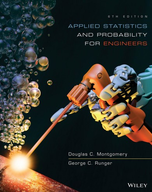Solution Found!
Analyzing Engineers' Graduate Plans: Fortune vs Engineering Horizons D
Chapter 9, Problem 98E(choose chapter or problem)
An article in Fortune (September 21, 1992) claimed that nearly one-half of all engineers continue academic studies beyond the B.S. degree, ultimately receiving either an M.S. or a Ph.D. degree. Data from an article in Engineering Horizons (Spring 1990) indicated that 117 of 484 new engineering graduates were planning graduate study.
(a) Are the data from Engineering Horizons consistent with the claim reported by Fortune? Use \(\alpha = 0.05\) in reaching your conclusions. Find the P-value for this test.
(b) Discuss how you could have answered the question in part (a) by constructing a two-sided confidence interval on \(p\).
Questions & Answers
QUESTION:
An article in Fortune (September 21, 1992) claimed that nearly one-half of all engineers continue academic studies beyond the B.S. degree, ultimately receiving either an M.S. or a Ph.D. degree. Data from an article in Engineering Horizons (Spring 1990) indicated that 117 of 484 new engineering graduates were planning graduate study.
(a) Are the data from Engineering Horizons consistent with the claim reported by Fortune? Use \(\alpha = 0.05\) in reaching your conclusions. Find the P-value for this test.
(b) Discuss how you could have answered the question in part (a) by constructing a two-sided confidence interval on \(p\).
ANSWER:
Step 1 of 7
Given,
Fortune claims that nearly half of all engineers continue academic studies beyond their B.S. degree.
Engineering Horizons claims that out of 484 new engineering graduates, 117 planned graduate study.
Watch The Answer!
Analyzing Engineers' Graduate Plans: Fortune vs Engineering Horizons D
Want To Learn More? To watch the entire video and ALL of the videos in the series:
This video contrasts Fortune's claim about engineers pursuing further studies with data from Engineering Horizons. Utilizing hypothesis testing and confidence intervals, we assess the validity of Fortune's assertion within a statistical framework.
